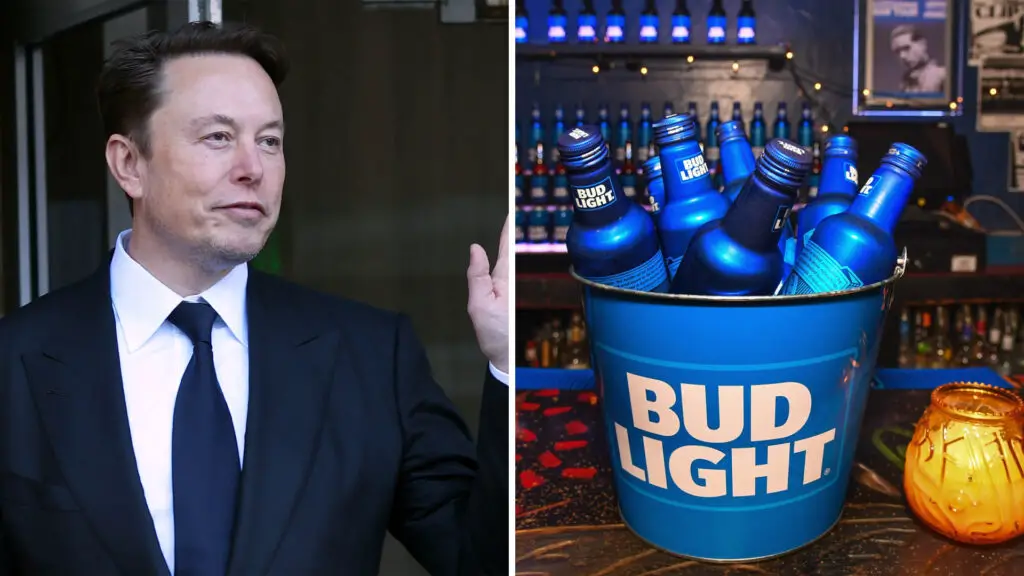In a surprising and unprecedented turn of events, Budweiser, one of the most iconic beer brands in the world, has reportedly suffered a staggering loss of $1 billion—and the cause is none other than tech mogul Elon Musk. The impact of Musk’s influence on the market is nothing new, but this particular instance has left both the beer industry and financial analysts reeling. As the dust begins to settle, many are left wondering how one man could cause such a massive financial disruption to a company as established as Budweiser.

The Incident: How Elon Musk Triggered Budweiser’s Billion-Dollar Loss
The chain of events that led to Budweiser’s monumental loss began with a single tweet from Elon Musk. Known for his ability to sway markets with his social media presence, Musk tweeted a seemingly innocuous statement about his preference for craft beer over mass-produced brands like Budweiser. In his tweet, Musk praised the quality and uniqueness of small-batch brews, subtly criticizing large beer corporations for what he implied was a lack of innovation and authenticity.
Within hours of the tweet, the market responded. Investors, always keen to follow Musk’s lead, began to sell off Budweiser’s parent company, Anheuser-Busch InBev’s stock, fearing a shift in consumer preferences. The stock price plummeted, wiping out nearly $1 billion in market value in just a matter of days. The ripple effect was immediate, with analysts downgrading the stock and predicting further losses if the trend continued.
Elon Musk’s Influence: A Double-Edged Sword
Elon Musk’s influence on the market is a well-documented phenomenon. From cryptocurrencies to electric vehicles, Musk’s opinions often translate into market movements, sometimes with extreme consequences. However, this incident with Budweiser highlights the potential dangers of such power. While Musk’s endorsement can propel companies to new heights, his criticism can equally bring them to their knees.
For Budweiser, the loss was not just financial but also reputational. Musk’s comments tapped into a growing consumer trend towards artisanal and craft products, signaling a potential shift away from traditional, mass-produced brands. This shift has been a slow but steady trend in the beer industry, but Musk’s tweet may have accelerated it, causing panic among investors and brand loyalists alike.
The Aftermath: Budweiser’s Response to the Crisis
In response to the market downturn, Budweiser has gone into damage control mode. The company quickly released statements reaffirming its commitment to quality and innovation, highlighting its long history and global reach as a testament to its enduring appeal. Anheuser-Busch InBev also announced plans to invest in new craft-style brewing operations and partnerships with local breweries to capture the market that Musk’s tweet had emphasized.
Despite these efforts, the damage was already done. Consumer sentiment had been swayed, and the stock continued to struggle. Budweiser’s marketing team is now tasked with the challenge of reshaping the brand’s image in a market that is increasingly valuing authenticity and craftsmanship over mass production.
The Broader Impact: What This Means for the Beer Industry
The fallout from Budweiser’s loss has sent shockwaves through the entire beer industry. Other large beer manufacturers are now reevaluating their strategies, fearing similar backlash if consumer preferences continue to shift towards craft and artisanal products. Companies are increasingly looking to diversify their portfolios, investing in smaller, craft beer brands, and developing new products that align with current trends.
Moreover, this incident has sparked a broader conversation about the power of social media and the influence of high-profile individuals like Elon Musk. It raises questions about the ethics of market influence and the responsibilities of those who wield such power. As industries grapple with the implications, regulators may also take a closer look at how social media can impact markets and whether any safeguards are necessary.
Elon Musk: A Catalyst for Change?
While the immediate effect of Musk’s tweet was disastrous for Budweiser, it also highlights his role as a catalyst for change. Musk has a history of challenging the status quo and pushing industries towards innovation. In this case, his comments may have accelerated a shift in the beer industry that was already underway. By championing smaller, craft brews, Musk inadvertently put pressure on large corporations to innovate and better align with changing consumer preferences.
For Budweiser, the challenge now is to adapt to this new reality. The company must navigate a market that is increasingly influenced by social media and consumer demand for authenticity. Whether Budweiser can successfully reposition itself remains to be seen, but the incident underscores the need for agility and innovation in today’s rapidly changing market landscape.
Conclusion: A Lesson in Market Volatility
The $1 billion loss suffered by Budweiser is a stark reminder of the volatility of today’s markets and the outsized influence that figures like Elon Musk can have. While Musk’s tweet may have been a simple expression of personal preference, its impact was anything but trivial. For companies, this serves as a lesson in the importance of staying attuned to consumer trends and the potential risks of ignoring the growing power of social media.





